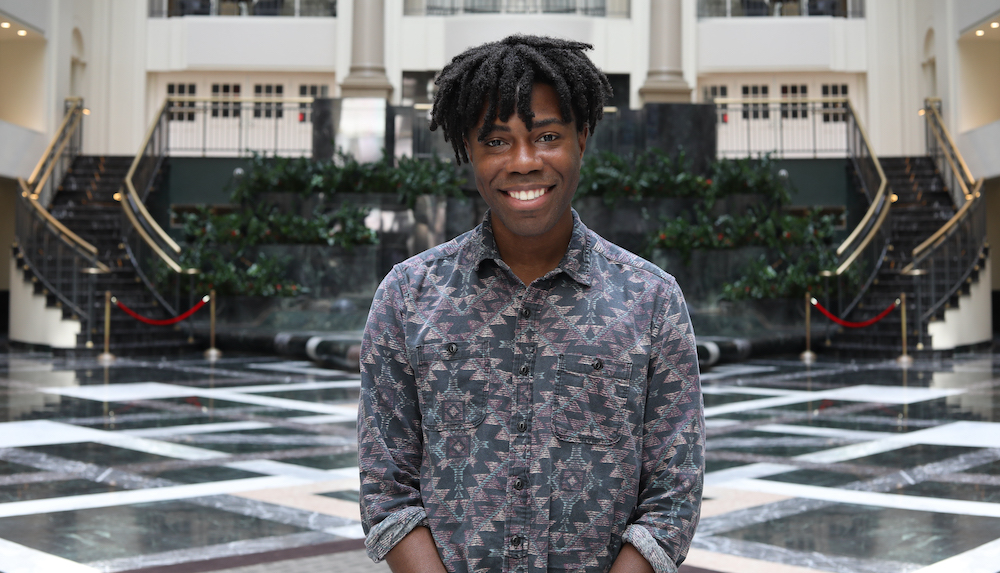A coalition of national nonprofits have banded together to pilot a fellowship that’s designed to create digital equity solutions not just for the community, but by the community. If successful in Baltimore and the five other pilot cities, this method could be implemented in communities across the country.
I’Tay Rivers, Baltimore’s Benton DEAR fellow, is a member of the AmeriCorps Ally Program. It’s a partnership between social justice advocacy nonprofit Public Allies and national service organization AmeriCorps. As a Benton DEAR Fellow, two months out of his 10-month AmeriCorps apprenticeship will take a digital equity lens via a residency at Charles Village-based Village Learning Place.
The DEAR Fellowship is a participatory action research program for young adults between ages 19-24, which helps to examine how digital inclusion coalitions understand and address the root causes of digital inequities in their communities. At the Village Learning Place, 22-year-old Rivers will be assessing programs and initiatives to find the best way he can incorporate digital equity to bridge the gap that leaves 96,000 households in Baltimore without internet.
“Participatory Action Research (PAR) centers the wisdom, leadership, and expertise of those closest to the issues,” said Shaun Glaze, research director of the Black Brilliance Research Project (BBR) one of the nonprofits that designed the fellowship, in a statement. “Doing this work well means disrupting systems of oppression and creating spaces where communities can explore — and create — their own solutions. By listening to those closest to the issues, we’re not just listening to the problems created by digital injustice, we’re co-creating the solutions we need for Black and Brown people to thrive.”
With the program having recently begun, Rivers is in the asset mapping portion of his work. The idea is to create an audit of the Village Learning Place’s resources and current programing, then make plans to address the needs of the community. This could lead to programming centered around increasing digital connectivity, more intros to STEM careers, or digital literacy programs. However, the exact programming has yet to be determined.
“The thing about these things is you can’t rush it. Timing is everything,” said Rivers, who was born in East Baltimore and raised in Baltimore County before bouncing around the DMV and graduating high school in Virginia. “Rushing that can cost the whole mission. What’s important is seeing how we can help people, help the community.”
The program is a joint collaboration between multiple nonprofits that bring fellows to six cities, including Baltimore, Boston, Cleveland, Long Beach, San Antonio, and Seattle. The Benton Institute for Broadband & Society, Community Informatics Lab at Simmons University, and BBR manage the DEAR Fellows. The Robert W. Deutsch Foundation is providing funding as the local partner in Baltimore, while Public Allies connected Rivers and Village Learning Place is the setting for the work.
Of the organizations coming together to support the work, Rivers said, “That’s amazing. Because that gives me even more opportunities to network and make a bigger and better imprint, see what I can help with and improve with the city.”
The two-month fellowship will conclude with a celebration and community event in mid-January.
Donte Kirby is a 2020-2022 corps member for Report for America, an initiative of The Groundtruth Project that pairs young journalists with local newsrooms. This position is supported by the Robert W. Deutsch Foundation.Before you go...
Please consider supporting Technical.ly to keep our independent journalism strong. Unlike most business-focused media outlets, we don’t have a paywall. Instead, we count on your personal and organizational support.
Join our growing Slack community
Join 5,000 tech professionals and entrepreneurs in our community Slack today!

The person charged in the UnitedHealthcare CEO shooting had a ton of tech connections

From rejection to innovation: How I built a tool to beat AI hiring algorithms at their own game

Where are the country’s most vibrant tech and startup communities?


